String Manipulation
1. REPLACE: Replace specified characters with others.
2. SUBSTRING: Extract specific characters.
3. CONCAT: Combine multiple strings for formatting.
Conditional Statements
1. IF: if(condition, value when condition is true, value when condition is false)
2. CASE WHEN END:
case when condition1 then value(expression)1
when condition2 then value(expression)2
else value(expression)3
end
While I was studying SQL, I wondered if it is possible to revise the data, and I would like to write down notes about what I studied for this.
Replace
select restaurant_name "Before",
replace(restaurant_name, 'Blue', 'Pink') "After"
from food_orders
where restaurant_name like '%Blue Ribbon%'
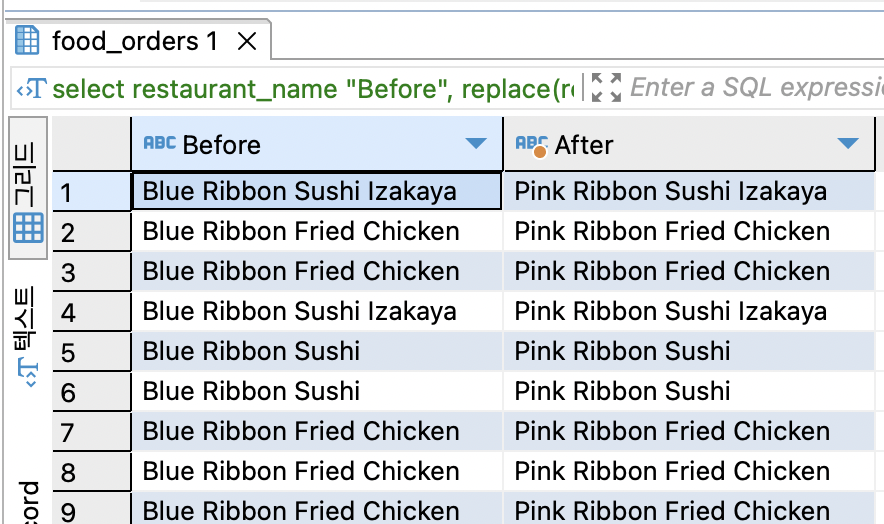
While using SQL, I wondered if it was possible to use a newly created column in another query. After trying various approaches, it seems that the newly created column couldn't be used directly. However, I found that I could obtain the result by using the formula which I used for the newly created column.
I wanted to use the column name '시도', but since it was newly created, I wasn't able to use it. Therefore, instead of using the newly created column name, I brought the formula that I used to create the new column again.
+ It is possible to use a newly created column by using Subquery
SELECT
addr AS "원래 주소",
SUBSTRING(addr, 1, 2) AS "시도",
CASE
WHEN SUBSTRING(addr, 1, 2) = '서울' THEN '서울'
ELSE '기타'
END AS "시도_포함여부"
FROM
food_orders
WHERE
addr LIKE '%서울특별시%'
Concat(enate) -
select restaurant_name "원래 이름",
addr "원래 주소",
concat('[', substring(addr, 1, 2), '] ', restaurant_name) "바뀐 이름"
from food_orders
where addr like '%서울%'
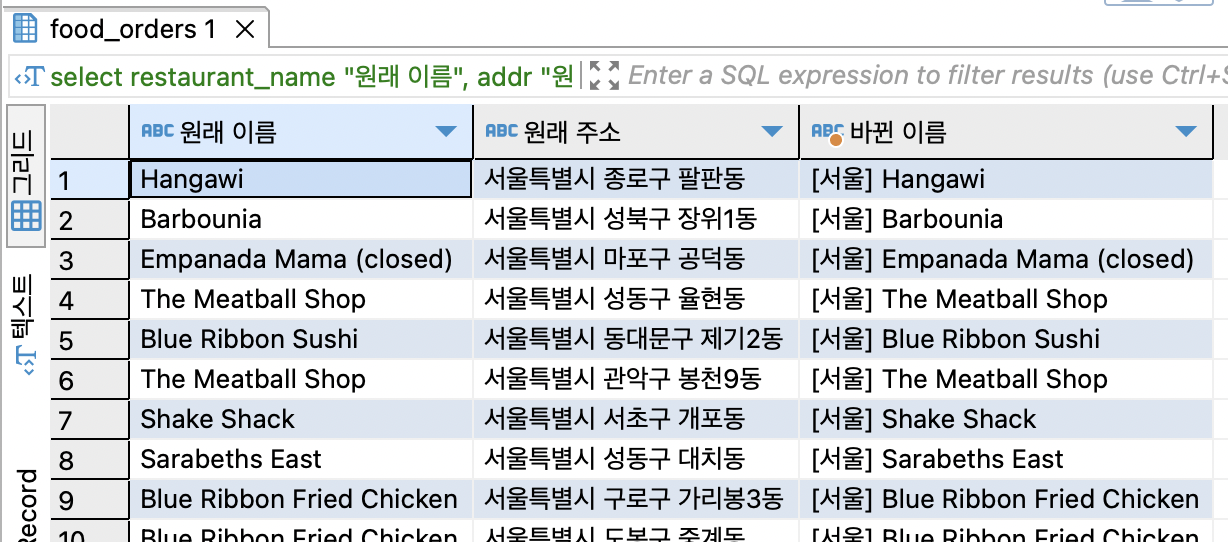
Group by practice
When you use 'group by', you can put 1, 2 instead of putting all the sentences from the 'select' line
select cuisine_type,
substr(addr, 1, 2) 'location',
addr,
price,
AVG(price) "average price"
from food_orders fo
where addr like '%서울%'
group by 2, 1
IF statement
I have used an IF statement to obtain the result. I was wondering if I can integrate another formula into the IF statement, and it worked well.
select email, substring(if(email like '%gmail%', replace(email, 'gmail', '@gmail'), email), 10) "email_domain",
count(customer_id) "count_customer",
avg(age) "average_age"
from customers
group by 1›
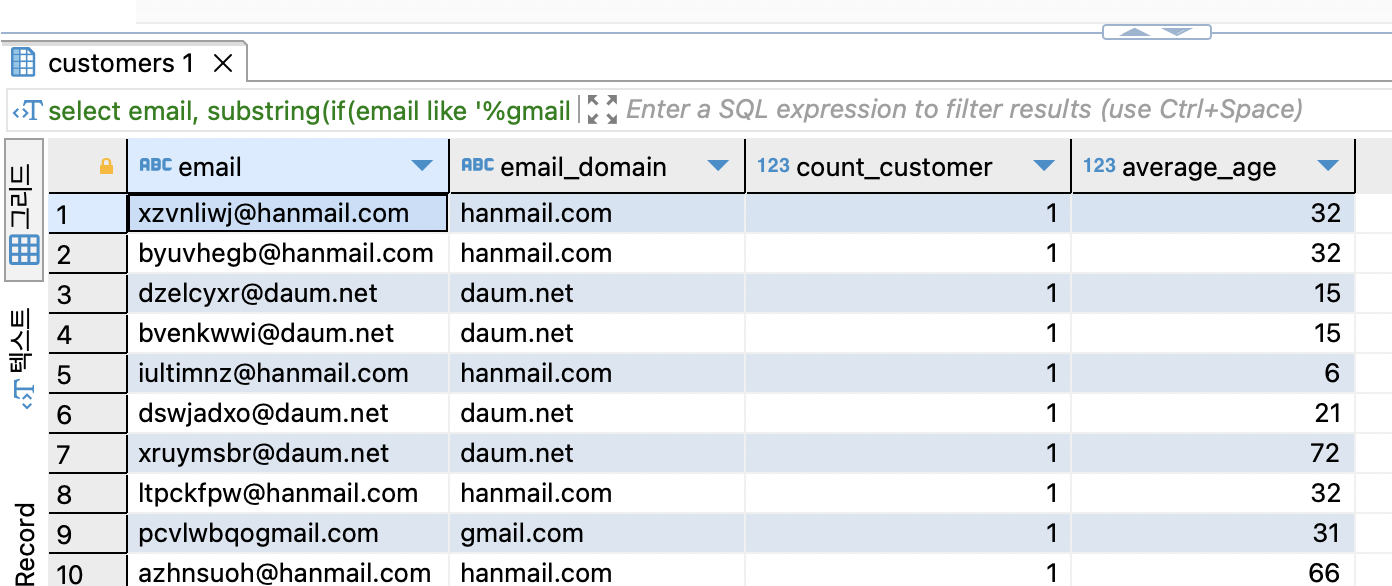
Case
Compared to the IF function, the CASE function seems more convenient and versatile. I guess i'm going to use the CASE function more frequently than the IF function in the future.
select restaurant_name,
addr,
case when addr like '%경기도%' then '경기도'
when addr like '%특별%' or addr like '%광역%' then substring(addr, 1, 5)
else substring(addr, 1, 2) end "New_address"
from food_orders
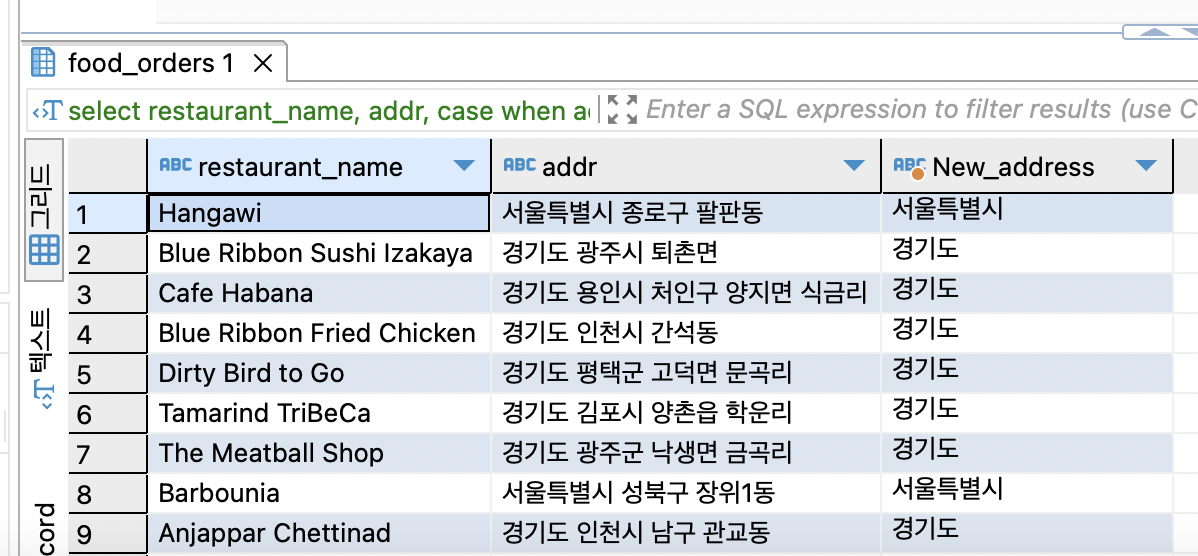
Practice 1
select restaurant_name,
price/quantity "Value",
cuisine_type,
order_id,
case when (price/quantity <5000) and cuisine_type='Korean' then 'Korean1'
when (price/quantity between 5000 and 15000) and cuisine_type='Korean' then 'Korean2'
when (price/quantity > 15000) and cuisine_type='Korean' then 'Korean3'
when (price/quantity <5000) and cuisine_type in ('Japanese', 'Chinese', 'Thai', 'Vietnamese', 'Indian') then 'Asia1'
when (price/quantity between 5000 and 15000) and cuisine_type in ('Japanese', 'Chinese', 'Thai', 'Vietnamese', 'Indian') then 'Asia2'
when (price/quantity > 15000) and cuisine_type in ('Japanese', 'Chinese', 'Thai', 'Vietnamese', 'Indian') then 'Asia3'
when (price/quantity <5000) and cuisine_type not in ('Korean', 'Japanese', 'Chinese', 'Thai', 'Vietnamese', 'Indian') then 'else1'
when (price/quantity between 5000 and 15000) and cuisine_type not in ('Korean', 'Japanese', 'Chinese', 'Thai', 'Vietnamese', 'Indian') then 'else2'
when (price/quantity > 15000) and cuisine_type not in ('Korean', 'Japanese', 'Chinese', 'Thai', 'Vietnamese', 'Indian') then 'else3' end "Restaurant_group"
from food_orders
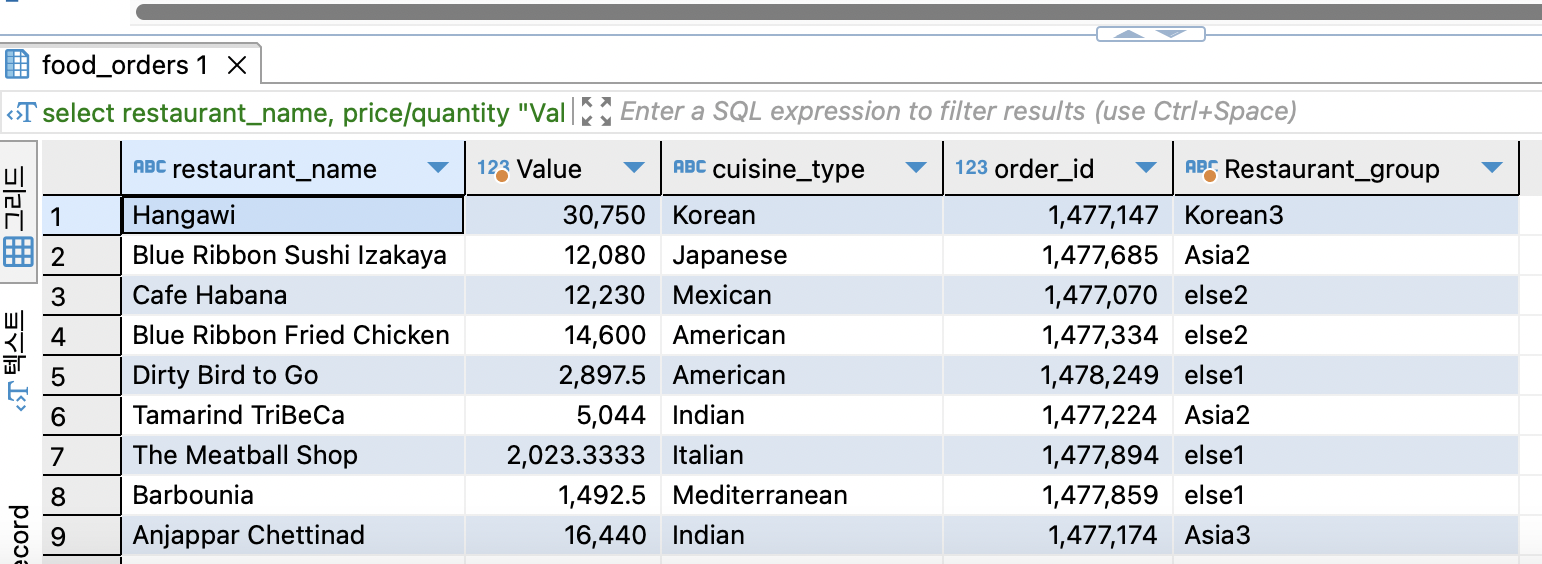
Practice 2
SELECT case when day_of_the_week='weekday' then 3000*if(quantity>3, 1.2, 1)
when day_of_the_week='weekend' then 3500*if(quantity>3, 1.2, 1)
end "Delivery_fee",
restaurant_name,
order_id,
day_of_the_week,
quantity
FROM food_orders fo
Error Note
When I tried to perform calculations with both characters and numbers, I encountered an error.
-> I used SQL queries at work, but when I used functions like avg, substring, I got an error message saying 'data type', and the queries wouldn't execute.
- It is possible to be happened in other SQL syntax, operations may fail if the data types are different.
- Looking at the example from 1), even though 'rating' contains numbers, it's stored as a character type.
(Please check the 'ABC' or '123' next to the column names in the output. 'ABC' indicates it's stored as a character.)

'Study Note > SQL' 카테고리의 다른 글
| NULL value (0) | 2024.03.22 |
|---|---|
| Left Join & Inner Join (0) | 2024.03.21 |
| Subquery (0) | 2024.03.21 |
| Calculating/Categorizing/Sorting (0) | 2024.03.20 |
| Understanding database and SQL (0) | 2024.03.19 |


